Submarine-inspired range extender management system allows an electric-powered truck to match range of a conventional ICE-powered one, James Gordon discovers.
The acclaimed British inventor Trevor Baylis once said ‘convention is the enemy of progress’. It is an assertion that no doubt resonates strongly with two entrepreneurs who are hoping to spark a revolution in the freight sector.
The two – Elon Musk and Asher Bennett – are involved in a race to create a commercially viable electric lorry.
Musk is the South African-born business magnate and inventor, most famous for manufacturing electric cars, who has just put a rocket into space.

Bennett, an Israeli, was a submarine commander before deciding to turn his attention to revolutionising truck fleets.
In December, and to much fanfare, Musk launched the Tesla Semi. According to Musk, the battery electric heavy duty truck, which weighs more than 33,000 pounds, will have a range of 500 miles and a charging time of less than an hour.
But, the salient facts regarding Tesla’s new invention – such as the price of the vehicle and where it will be manufactured – remain unclear, which has led some to believe that the long anticipated dream of electric fleets is still some way off.
The naysayers point to range anxiety, a lack of charging infrastructure and the fact that battery electric vehicles are not as powerful as their internal combustion engine (ICE) counterparts.
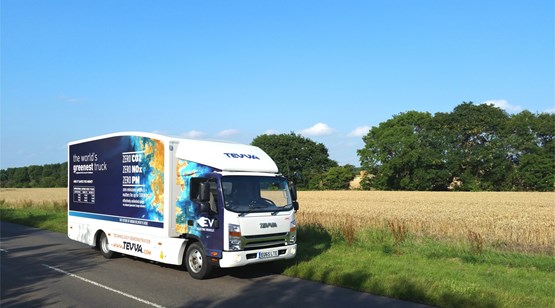
Groundbreaking concept
These are all obstacles that chief executive of Tevva Motors Asher Bennett and his team of 20 have negotiated thanks to the company’s pioneering Predictive Range Extender Management System (PREMS) – a groundbreaking concept inspired by his submarine training.
Speaking from his Chelmsford offices, Bennett says: “I realised the energy management system used by a diesel-electric submarine could also be applied to trucks.
“It could be utilised to meet the challenge of a lack of charging infrastructure points that is stymieing growth in the zero-emission sector.”
READ MORE: Tevva Motors retrofit range-extender package now available
However, Bennett would have to wait several years before he could put his idea into practice. And, as is often the experience of inventers, it required a setback to put him on the right path.
Bennett recalls: “As the CEO of Evida Power, a start-up I co-founded in 2008, we had won an order totalling in excess of US$100 million (£70m+) from a vehicle manufacturer to produce batteries for electric vehicles.
“Unfortunately, the OEM folded and we lost the order. The experience taught me that to succeed it wasn’t enough to make batteries. Instead, our USP had to be the trucks as well.
"It was a pivotal moment for everyone involved and that’s when Tevva was born.”
Bennett, a serial entrepreneur, and a founding shareholder of Cyota, a cyber security company which was bought by RSA Securities in 2005 for USD$145m, decided to pursue what he and the logistics industry terms “the holy grail”: the medium- and heavy-duty urban back-to-base truck market.
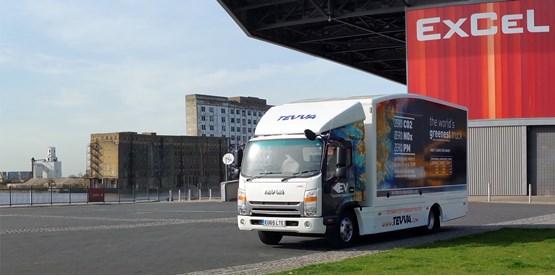
Fast forward five years to 2018 and Tevva’s pioneering CEO is much in demand. Bennett has just returned from Beijing where he was part of Prime Minister Theresa May’s trade delegation.
His company is flourishing, too. In the UK, it has just secured a contract to build 15 trucks for the UK arm of a multinational shipping giant.
While Bennett is unable to reveal the name of the company or details of the order, he does confirm that Tevva is working with several “household names in the parcel delivery and high street coffee sectors” and around 30 more large logistics providers in Europe, America and China.
READ MORE: Driven: Tevva range-extender prototype (2016) truck review
Each truck is equipped with a lithium iron phosphate battery, which enables the vehicle to travel up to 120 zero-emission miles on a single charge, and a range extender which, according to Bennett, allows “the lorry to travel the same distance as a conventionally-powered one”.
However, for Bennett it is “not so much the range extender, but the management system which underpins it”, that sets Tevva’s trucks apart from its competitors.
But what is the science behind it? Bennett explains that the PREMS enables the fleet operator to remotely plot the vehicle’s daily route, calculating fluctuations in weight in real-time before the vehicle leaves the depot.
He says: “Taking into account the topography of the road and traffic patterns the driver will encounter, it will proactively work out the required amount of energy in kilowatt hours that the 74 kWh battery needs for the driver to carry out all deliveries and return to base.”
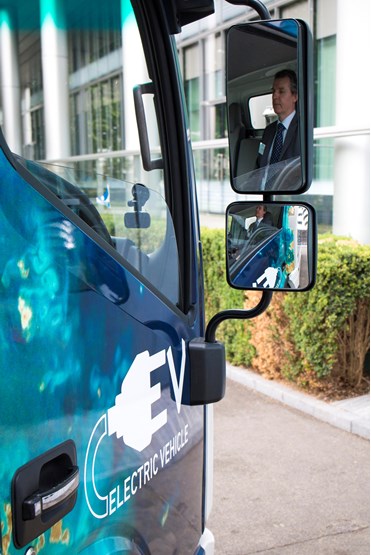
The lorries, which have also been fitted with a small 1.5-litre capacity fuel-powered ICE, are exempt from the London Congestion Charge.
And, as zero-emission vehicles, Bennett says “they surpass the required standards of emissions for the ultra-low emissions zones” (ULEZ), which will be introduced in London and other European cities over the next few years.
But how does the PREMS technology guarantee zero-emission operations in clean air zones?
Terrain and congestion
Bennett explains: “Custom-built GPS technology continues to relay the road terrain and congestion to the PREMS in real-time.
"It also calculates how many kilowatt hours of energy the regenerative braking system will return to the battery over the course of the journey. It then feeds the information back to the range extender.
“The extender evaluates the driver’s route and selects a point early on in the trip to run the extender.
"The key point is that the energy management system ensures that the ICE only operates for the minimum period of time every day, and is only ever utilised on strategic road networks outside of town and cities.”

READ MORE: Tevva Motors commended at Rushlight Awards
If range anxiety is a hurdle that Bennett and his team have overcome, another potential barrier to entry – the high cost of a new truck – still looms large.
Bennett says: “While it is true that the capital expenditure on a brand new Tevva electric range-extending vehicle (EREV) is around twice as much as its Euro-6 diesel-powered equivalent, the operating expense is far less.
"However, if we focus on the leasing model, which is commonly used throughout the UK and Europe, the monthly rental fee for a new 7.5-tonne Tevva truck is approximately £400 higher than a similar sized ICE.
"But, when you factor in the fuel/electricity costs, at just 6p per mile the net cost per month of operating one of our vehicles is around £200 cheaper than a diesel.”
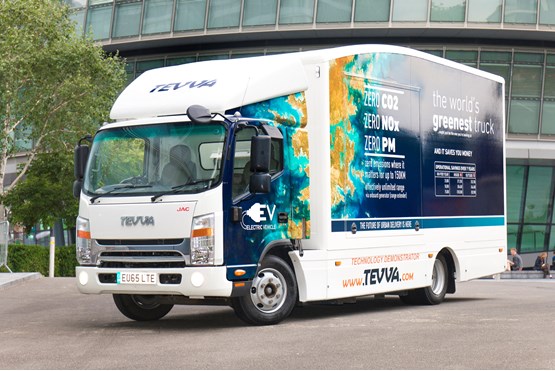
Heavier gross weights
But perhaps the greatest step to negotiate is to make the transition from a 7.5-tonne vehicle to heavier gross weights.
While some sections of the freight industry continue to express doubts that the electric HGV will ever see the light of day due to the gargantuan size and weight of the battery pack, it is not a view shared by Bennett.
“At Tevva, we believe nothing to be impossible. Tevva is working on a number of R&D prototypes this year – one of which is to build, test and deliver an 18-tonne electric vehicle with range extending technology.
READ MORE: Tevva Motors develops 7.5-tonne electric range extender truck
"While this will be a ‘back-to-base’ vehicle, the electric trans-axle technology we are developing will, I think, be transferable to larger fleet vehicles weighing from 32 to 44 tonnes.
“But there are a number of technological challenges our R&D department needs to overcome before we can reach this milestone, including the creation of new electric motor technology and a new battery system.”
He concludes: “In terms of the long-haul articulated vehicle market, by deploying range extending technology, which utilises a much lighter battery pack, and by fuelling the range extender with glycerine (an artificial sweetener which Tevva is currently developing with Aquafuel), we estimate that the vehicle would be able to travel emission-free from Chelmsford to Rome, via Paris and Milan, without ever needing to use a charging point.”



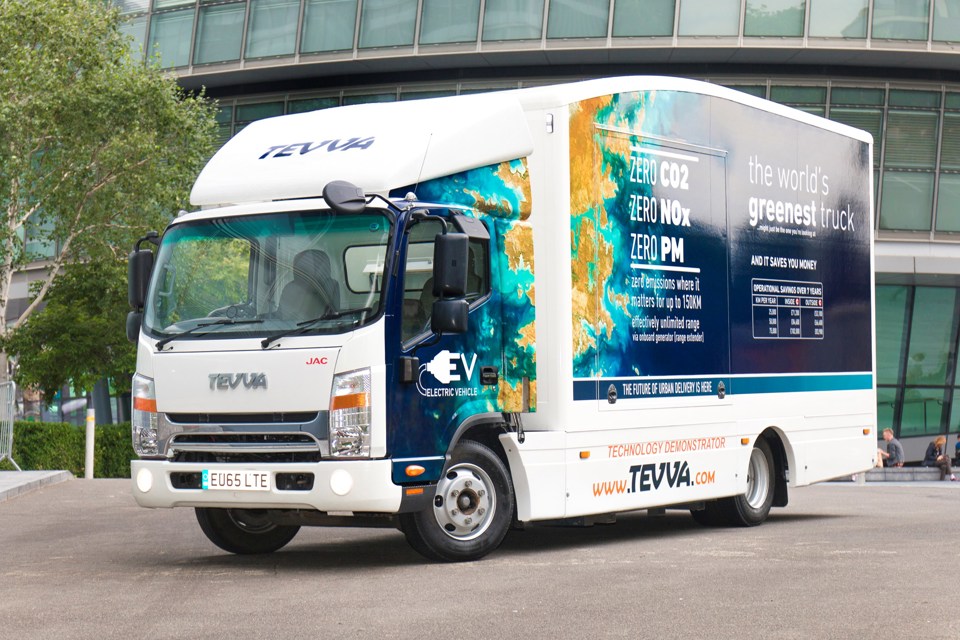














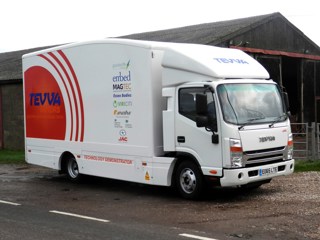
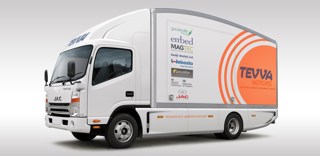
Login to comment
Comments
No comments have been made yet.